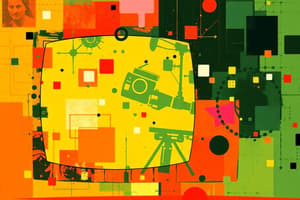Podcast
Questions and Answers
Which convergence type is best described as the blending of different media formats and platforms?
Which convergence type is best described as the blending of different media formats and platforms?
- Cultural Convergence (correct)
- Economic Convergence
- Organic Convergence
- Global Convergence
What is the term for the phenomenon where media consumers actively contribute to and shape the media they consume?
What is the term for the phenomenon where media consumers actively contribute to and shape the media they consume?
- Media Stack
- Reciprocal Effect
- Participatory Culture (correct)
- Third-party Theory
Which of the following best describes the main characteristic that differentiates 'traditional media' from 'new media'?
Which of the following best describes the main characteristic that differentiates 'traditional media' from 'new media'?
- Traditional media existed before the widespread use of the internet, while new media emerged with computer technology. (correct)
- Traditional media is primarily used for domestic purposes, while new media is commonly used for global communication.
- Traditional media relies exclusively on digital platforms, while new media utilizes analog methods.
- Traditional media is solely focused on entertainment, while new media provides essential information.
Which concept is defined as the natural result of a world with diverse and numerous media formats, often characterized by multitasking and media stacking?
Which concept is defined as the natural result of a world with diverse and numerous media formats, often characterized by multitasking and media stacking?
Which type of convergence is demonstrated by the spread of styles of filmmaking across geographically distant cultures?
Which type of convergence is demonstrated by the spread of styles of filmmaking across geographically distant cultures?
The term 'media convergence' primarily refers to which of the following?
The term 'media convergence' primarily refers to which of the following?
Which of these describes the linking of companies and businesses to the media industry?
Which of these describes the linking of companies and businesses to the media industry?
Which example best demonstrates 'Technological Convergence' as described in the text?
Which example best demonstrates 'Technological Convergence' as described in the text?
What role do 'gatekeepers' play in the context of media?
What role do 'gatekeepers' play in the context of media?
What is mass media primarily characterized by?
What is mass media primarily characterized by?
According to the content, which of these is NOT a characteristic of 'new media'?
According to the content, which of these is NOT a characteristic of 'new media'?
Which theory suggests individuals believe they are less susceptible to media influence compared to their peers?
Which theory suggests individuals believe they are less susceptible to media influence compared to their peers?
What is the primary function of 'social media' as described in the text?
What is the primary function of 'social media' as described in the text?
Which organization is responsible for rating television programs and films in the Philippines?
Which organization is responsible for rating television programs and films in the Philippines?
How does 'media convergence' impact the typical content creation process of traditional media?
How does 'media convergence' impact the typical content creation process of traditional media?
What is a key benefit of new media as noted in the content regarding information dissemination?
What is a key benefit of new media as noted in the content regarding information dissemination?
Flashcards
Traditional Media
Traditional Media
Media that was introduced to the market before the internet became widely accessible. Examples include newspapers, magazines, radio, and television.
New Media
New Media
Media that developed alongside the widespread use of computers and the internet. It includes information that is created and delivered digitally.
Social Media
Social Media
A subcategory of new media that focuses on social interaction and communication using computer programs. Examples include Facebook, Twitter, and Instagram.
Mobile Communications Technology
Mobile Communications Technology
Signup and view all the flashcards
Media Convergence
Media Convergence
Signup and view all the flashcards
Technological Convergence
Technological Convergence
Signup and view all the flashcards
Cultural Convergence
Cultural Convergence
Signup and view all the flashcards
Organic Convergence
Organic Convergence
Signup and view all the flashcards
Story Flow (Cultural Convergence)
Story Flow (Cultural Convergence)
Signup and view all the flashcards
Participatory Culture
Participatory Culture
Signup and view all the flashcards
Organic Convergence (Social Convergence)
Organic Convergence (Social Convergence)
Signup and view all the flashcards
Global Convergence
Global Convergence
Signup and view all the flashcards
Economic Convergence
Economic Convergence
Signup and view all the flashcards
Third-Party Theory
Third-Party Theory
Signup and view all the flashcards
Reciprocal Effect
Reciprocal Effect
Signup and view all the flashcards
Study Notes
Types of Media
-
Traditional Media: Media existing before the Internet
- Print Media: Newspapers, magazines, comics, books
- Broadcast Media: Electronic media using technology to deliver information
- Film/Cinema: Movies projected onto large screens
- Examples: Newspapers, broadcast media, film, magazines
-
New Media (Digital Media): Developed with common computer use
- Computer-originated and often Internet-delivered information
- Mobile technology and ICT products/systems included
-
Social Media: A subcategory of new media
- Internet-based programs for connecting with others
-
Mobile Communications Technology: Smartphones combining various media technologies
- Originally for long-distance communication, now similar to computers/laptops
- Tablets are mobile versions of laptops
Media Convergence
-
Convergence: Combining elements to create a new whole; intersection of forces
-
Media Convergence: Digitalization of ICTs with Internet platforms
- Influences media content creation and delivery
- Uses traditional media production methods with new media distribution
- Reduces reliance on gatekeepers (filters of information)
-
Importance of Convergence: Intersection of traditional and new media eliminates gatekeepers
- Celebrated for reduced dependence on one-way information dissemination
-
Jenkins' Five Types of Convergence:
- Technological Convergence: Blurring lines between traditional media types; using varied platforms & media types to support media content. (e.g. TV shows/radio programs no longer exclusively accessible via television sets and radios)
- Cultural Convergence: Flow of stories from one format to another; adaptations and participatory culture (consumers adding input to media and creating their own). (Example: Mars Ravelo comic books adapted to TV series/films; YouTube)
- Organic Convergence: Natural outcome in a world with diverse media types (social convergence or "media stacking"); simultaneous use of multiple media (using a smartphone while watching TV or reading a newspaper while listening to the radio)
- Global Convergence: Bridging gaps between distant cultures, influencing each other; Hollywood's influence in Bollywood (India) and Nollywood (Nigeria)
- Economic Convergence: Linking of companies and businesses to the media; large companies investing in many media industries (example: Rupert Murdoch's News Corporation).
Mass Media and Media Effects
- Mass Media: Channels transmitting information to large groups
- Media Effects: Intended and unintended consequences of mass media
- Third-Party Theory: Belief that others are more susceptible to media influence than oneself.
- Reciprocal Effect: Media attention influencing a person/event's actions (increased self-consciousness)
- Boomerang Effect: Media-induced change opposite to the desired one
- Cultivation Theory (George Gerbner): Media exposure (particularly TV) shapes social reality with a distorted view of violence and risk.
Movie Classification Ratings
- MTRCB (Movie and Television Review and Classification Board): Government agency responsible for rating TV programs and films in the Philippines.
Studying That Suits You
Use AI to generate personalized quizzes and flashcards to suit your learning preferences.




